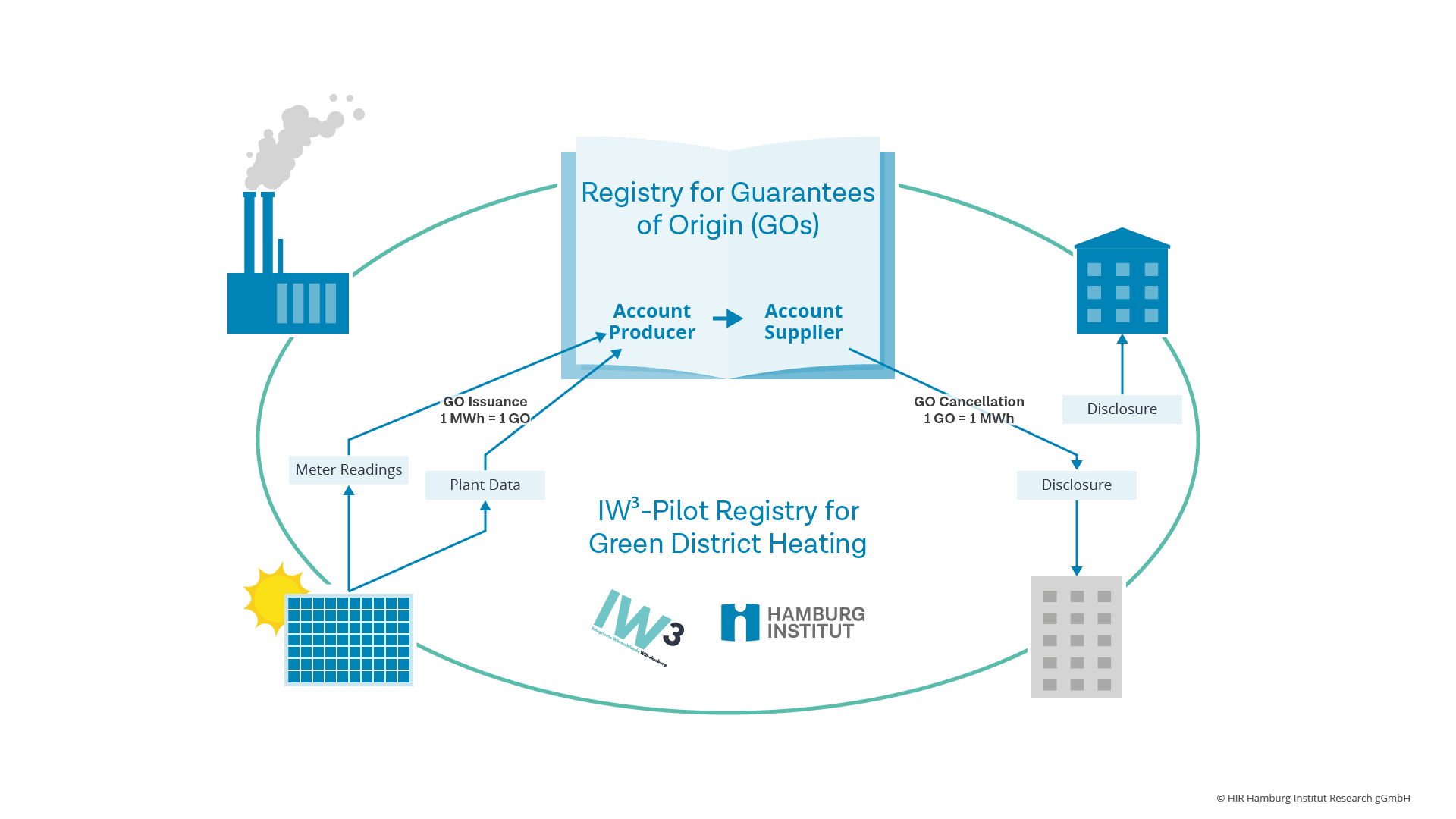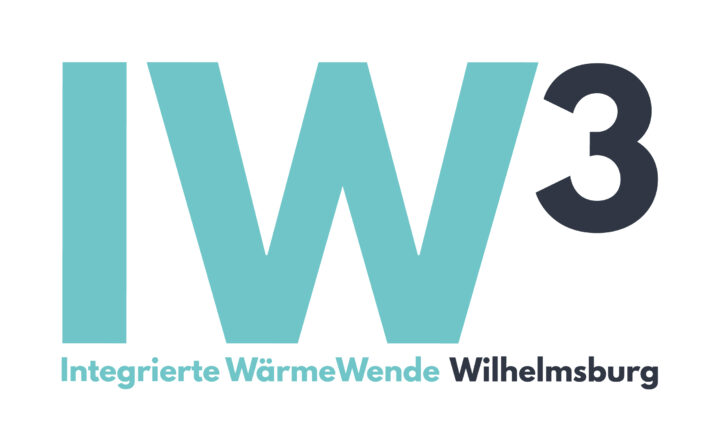
IW3: beacon project of the energy transition
As part of the BMWK-funded Energy Transition Laboratory IW3, Hamburg Institut developed the first Guarantees of Origin pilot registry for green district heating in Germany. Heating Guarantees of Origin (GOs) make it possible to allocate green heat quantities to individual buildings and neighbourhoods. In the future, marketing green district heating as a distinct product could help to improve the economic viability of projects for district heating generation from renewable energies and waste heat.
About the IW3 Project
The name IW³ stands for “Integrierte WärmeWende Wilhelmsburg”. The aim of the project is to establish a climate-friendly decentralised heating supply for the residential quarters on Hamburg’s Elbe island that is CO₂-neutral and can manage without fossil fuels in the long term.
IW³ is one of the “Reallabore der Energiewende” (Energy Transition Laboratories). With this research project from the NextGenerationEU programme, the German Federal Ministry for Economic Affairs and Climate Action (BMWK) promotes the implementation of innovation projects on an industrial scale in order to accelerate the transfer of technologies and solutions for the energy transition to the market. IW3 is being implemented under the leadership of Hamburger Energiewerke, supported by a consortium of various partners, including Hamburg Institut Research gGmbH (HIR).

The core elements of the energy transition laboratory are the construction of a geothermal plant (IWU ) and an aquifer storage facility as well as research on the system integration of different heat sources (IWS ) and on novel trading and marketing mechanisms for climate-friendly district heating (IWM ).
Our “Green District Heating” sub-project
In the IW3 project “Integrated Heating Market” (IWM ), Hamburg Institut is implementing the sub-project “Green District Heating”. As a pilot project for Germany, a Guarantees of Origin registry for green district heating is being developed with the aim of making it possible to allocate green heat quantities to individual buildings and neighbourhoods. Building on experiences with the certified green electricity market, producers and heating suppliers will be able to market green district heating as a distinct product in a legally secure manner. Revenues from this can facilitate the refinancing of new projects for the generation of renewable district heating and thus create additional decarbonisation incentives.
Registry for green district heating
Germany’s first Guarantees of Origin registry for green district heating went live at the end of May 2022. Heat suppliers and heat generators were able to participate in the pilot registry until the end of the project in July 2024.
The technical implementation of the registry was carried out in cooperation with Grexel. The first the first heating Guarantee of Origin for the Hamburger Energiewerke will be issued soon.

Approach
- Analysis of the energy economic, regulatory and technical framework conditions for the introduction of GO in the heating market
- Exchange with stakeholders to deepen insights on the needs of different market participants on the supply and consumption sides
- Implementation of a software-based Guarantees of Origin registry for green district heating which enables legally compliant verification of the green credentials of marketed heat quantities
- Systematic evaluation of experiences from the use and operation of the registry
- Investigation of innovations in district heating marketing through Guarantees of Origin
Results
Framework conditions and design options for heat GOs
The project report, published in August 2023, presents the European and German legal framework conditions for the marketing of green district heating and cooling and the introduction of GOs as an instrument for proving the green origin of thermal energy. It discusses the various roles that GOs could play in the transformation of the heating sector towards climate neutrality. In addition, the most important design options for heating and cooling GO systems are analysed. This includes
- the handling of grid boundaries of heating and cooling supply systems,
- the handling of storage and network losses,
- the role of heat customers in the national registry,
- the GO issuing for self-supply with thermal energy,
- the cross-sectoral tracking of green properties in energy source conversion,
- the verification of plant and measurement data in vertically integrated grids and
- the implementation of heating and cooling labelling rules.
The solutions selected in the IW3 pilot registry are documented for each of these issues, with an outlook on the priorities that can be set for the national implementation of heating and cooling GO systems.
Evaluation of the registry operation
The following recommendations for the implementation of the national registry of Guarantees of Origin for thermal energy can be derived from the experience gained from the pilot operation of the registry:
- Utilisation of synergies in system registration and verification (e.g. with the Federal Network Agency’s market master data register, which will also be extended to the heating industry in the future)
- Establishment of interfaces for tracking conversion processes (e.g. to the national registry for electricity and the future national registry for gas as well as corresponding mass balance systems for gases)
- Possibilities for automating the use of registers (e.g. setting up APIs for automated data exchange with smart meters)
In general, the benefits of the upcoming national GO registry for heating/cooling were assessed as positive by the users of the register, as offering green heat products via GOs can contribute to the competitiveness of grid-based heat supply and additional financial flows can be realised to support decarbonisation.
Innovations in district heating marketing through GO
Finally, the sub-project focussed on the question of the potential for innovation in district heating marketing arising from the implementation of a national GO registry for thermal energy.
- The possibility of allocating green energy quantities to specific heat consumption by means of GOs and corresponding labelling means that product diversification can be implemented as an innovation in district heating sales. This means that a green district heating product can be offered with different district heating qualities compared to the basic product.
- In terms of organisational innovations, the implementation of GO as a transparent and state-recognised verification instrument can realise potential in the simplification of verification in the district heating context.
- Technical innovations could arise in relation to the digitalisation and possible automation of verification processes through the integration of a central registry in corresponding processes.
More information on IW3 on the project website
Contact for further information:
Marina Kemper
Contact
DID we spark your interest?
Meet Hamburg Institut in person
Conferences, lectures, workshops, trade fairs - the team of Hamburg Institut is looking forward to meeting you in person and exchanging ideas with you. We will inform you here as soon as new dates are fixed.
